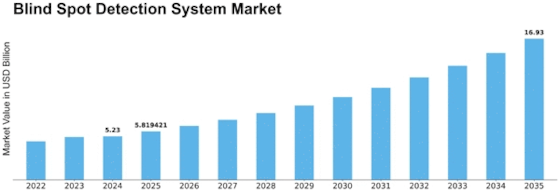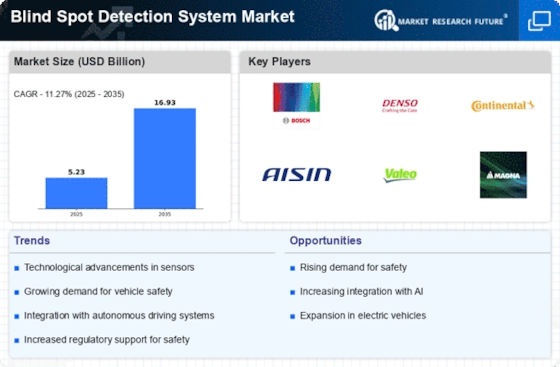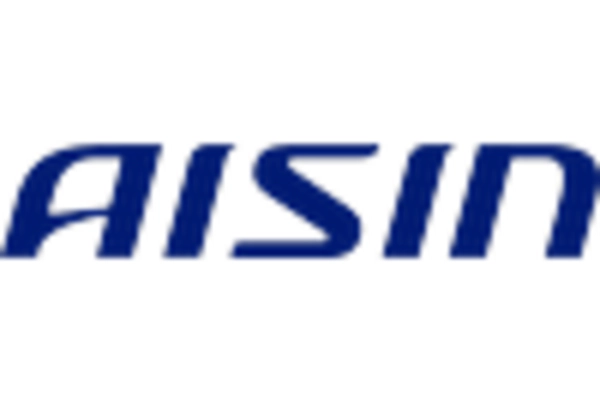-
EXECUTIVE SUMMARY
-
GLOBAL BLIND SPOT OBJECT DETECTION SYSTEM MARKET, BY TECHNOLOGY
-
GLOBAL BLIND SPOT OBJECT DETECTION SYSTEM MARKET, BY VEHICLE TYPE
-
GLOBAL BLIND SPOT OBJECT DETECTION SYSTEM MARKET, BY VEHICLE TYPE
-
MARKET INTRODUCTION
-
DEFINITION
-
SCOPE OF THE STUDY
-
RESEARCH OBJECTIVE
-
MARKET STRUCTURE
-
RESEARCH METHODOLOGY
-
RESEARCH PROCESS
-
PRIMARY RESEARCH
-
SECONDARY RESEARCH
-
MARKET SIZE ESTIMATION
-
FORECAST MODEL
-
LIST OF ASSUMPTIONS
-
MARKET DYNAMICS
-
OVERVIEW
-
DRIVERS
- INCREASING DEMAND FOR SAFETY FEATURES IN AUTOMOBILES ACROSS THE GLOBE
- RISING TECHNOLOGICAL ADVANCEMENTS IN AUTOMOBILES
-
RESTRAINTS
- TECHNOLOGICAL LIMITATIONS ASSOCIATED WITH THE BLIND SPOT OBJECT DETECTION SYSTEM
- LACK OF SKILLED WORKFORCE
-
OPPORTUNITY
- GROWING DEMAND OF CONSUMERS FOR LUXURY VEHICLES
-
IMPACT ANALYSIS OF COVID-19
- OVERVIEW
- IMPACT ON OVERALL SPENDING ON COMPONENT MANUFACTURERS
- IMPACT ON ACROSS VARIOUS INDUSTRY END USER
- IMPACT ON OVERALL MARKET Y-O-Y FROM 2020-2032
-
MARKET FACTOR ANALYSIS
-
VALUE CHAIN ANALYSIS
- R&D
- MANUFACTURING
- DISTRIBUTION AND SALES
- POST-SALES MONITORING
-
PORTER’S FIVE FORCES MODEL
- BARGAINING POWER OF SUPPLIERS
- BARGAINING POWER OF BUYERS
- THREAT OF NEW ENTRANTS
- THREAT OF SUBSTITUTES
- INTENSITY OF RIVALRY
-
GLOBAL BLIND SPOT OBJECT DETECTION SYSTEM MARKET, BY TECHNOLOGY
-
OVERVIEW
- RADAR SENSOR
- CAMERA
-
GLOBAL BLIND SPOT OBJECT DETECTION SYSTEM MARKET, BY VEHICLE TYPE
-
OVERVIEW
- PASSENGER VEHICLE
- COMMERCIAL VEHICLE
-
GLOBAL BLIND SPOT OBJECT DETECTION SYSTEM MARKET, BY SALES CHANNEL
-
OVERVIEW
- OEM
- AFTERMARKET
-
GLOBAL BLIND SPOT OBJECT DETECTION SYSTEM MARKET, BY REGION
-
OVERVIEW
- GLOBAL BLIND SPOT OBJECT DETECTION SYSTEM MARKET, BY REGION, 2024–2032
-
EUROPE
- EUROPE: BLIND SPOT OBJECT DETECTION SYSTEM MARKET, BY COUNTRY, 2024–2032
- EUROPE: BLIND SPOT OBJECT DETECTION SYSTEM MARKET, BY TECHNOLOGY, 2024–2032
- EUROPE: BLIND SPOT OBJECT DETECTION SYSTEM MARKET, BY VEHICLE TYPE, 2024–2032
- UK
- GERMANY
- FRANCE
- ITALY
- REST OF EUROPE
-
NORTH AMERICA
- NORTH AMERICA: BLIND SPOT OBJECT DETECTION SYSTEM MARKET, BY COUNTRY, 2024–2032
- NORTH AMERICA: BLIND SPOT OBJECT DETECTION SYSTEM MARKET, BY TECHNOLOGY, 2024–2032
- NORTH AMERICA: BLIND SPOT OBJECT DETECTION SYSTEM MARKET, BY VEHICLE TYPE, 2024–2032
- US
- CANADA
- MEXICO
-
ASIA-PACIFIC
- ASIA-PACIFIC: BLIND SPOT OBJECT DETECTION SYSTEM MARKET, BY COUNTRY, 2024–2032 (USD MILLION)
- ASIA-PACIFIC: BLIND SPOT OBJECT DETECTION SYSTEM MARKET, BY TECHNOLOGY, 2024–2032
- ASIA-PACIFIC: BLIND SPOT OBJECT DETECTION SYSTEM MARKET, BY VEHICLE TYPE, 2024–2032
- CHINA
- JAPAN
- INDIA
- SOUTH KOREA
- REST OF ASIA-PACIFIC
-
MIDDLE EAST & AFRICA
- MIDDLE EAST & AFRICA: BLIND SPOT OBJECT DETECTION SYSTEM MARKET, BY TECHNOLOGY, 2024–2032
- MIDDLE EAST & AFRICA: BLIND SPOT OBJECT DETECTION SYSTEM MARKET, BY VEHICLE TYPE, 2024–2032
-
SOUTH AMERICA
- SOUTH AMERICA: BLIND SPOT OBJECT DETECTION SYSTEM MARKET, BY TECHNOLOGY, 2024–2032
- SOUTH AMERICA: BLIND SPOT OBJECT DETECTION SYSTEM MARKET, BY VEHICLE TYPE, 2024–2032
-
COMPETITIVE LANDSCAPE
-
OVERVIEW
-
COMPETITIVE BENCHMARKING
-
MARKET SHARE ANALYSIS
-
KEY DEVELOPMENTS IN THE GLOBAL BLIND SPOT OBJECT DETECTION SYSTEM MARKET
- PRODUCT LAUNCH
- CONTRACT
-
COMPANY PROFILES
-
CONTINENTAL AG
- COMPANY OVERVIEW
- FINANCIAL OVERVIEW
- PRODUCTS OFFERED
- KEY DEVELOPMENTS
- SWOT ANALYSIS
- KEY STRATEGIES
-
ROBERT BOSCH GMBH
- COMPANY OVERVIEW
- FINANCIAL OVERVIEW
- PRODUCTS OFFERED
- KEY DEVELOPMENT
- SWOT ANALYSIS
- KEY STRATEGIES
-
DAIMLER AG
- COMPANY OVERVIEW
- FINANCIAL OVERVIEW
- PRODUCTS OFFERED
- KEY DEVELOPMENTS
- SWOT ANALYSIS
- KEY STRATEGIES
-
AUTOLIV INC.
- COMPANY OVERVIEW
- FINANCIAL OVERVIEW
- PRODUCTS OFFERED
- KEY DEVELOPMENTS
- SWOT ANALYSIS
- KEY STRATEGIES
-
GENTEX CORPORATION
- COMPANY OVERVIEW
- FINANCIAL OVERVIEW
- PRODUCTS OFFERED
- KEY DEVELOPMENTS
- SWOT ANALYSIS
- KEY STRATEGIES
-
MOBILEYE
- COMPANY OVERVIEW
- FINANCIAL OVERVIEW
- PRODUCTS OFFERED
- KEY DEVELOPMENTS
- SWOT ANALYSIS
- KEY STRATEGIES
-
ZF FRIEDRICHSHAFEN AG
- COMPANY OVERVIEW
- FINANCIAL OVERVIEW
- PRODUCTS OFFERED
- KEY DEVELOPMENTS
- SWOT ANALYSIS
- KEY STRATEGIES
-
FICOSA
- COMPANY OVERVIEW
- FINANCIAL OVERVIEW
- PRODUCTS OFFERED
- KEY DEVELOPMENTS
- SWOT ANALYSIS
- KEY STRATEGIES
-
BORGWARNER INC. (DELPHI TECHNOLOGIES)
- COMPANY OVERVIEW
- FINANCIAL OVERVIEW
- PRODUCTS OFFERED
- KEY DEVELOPMENTS
- SWOT ANALYSIS
- KEY STRATEGIES
-
NISSAN MOTOR CO LTD
- COMPANY OVERVIEW
- FINANCIAL OVERVIEW
- PRODUCTS OFFERED
- KEY DEVELOPMENTS
- SWOT ANALYSIS
- KEY STRATEGIES
-
DENSO CORPORATION
- COMPANY OVERVIEW
- FINANCIAL OVERVIEW
- PRODUCTS OFFERED
- KEY DEVELOPMENTS
- SWOT ANALYSIS
- KEY STRATEGIES
-
MAGNA INTERNATIONAL INC
- COMPANY OVERVIEW
- FINANCIAL OVERVIEW
- PRODUCTS OFFERED
- KEY DEVELOPMENTS
- SWOT ANALYSIS
- KEY STRATEGIES
-
VALEO
- COMPANY OVERVIEW
- FINANCIAL OVERVIEW
- PRODUCTS OFFERED
- KEY DEVELOPMENTS
- SWOT ANALYSIS
- STRATEGY
-
HITACHI ASMETO AMERICAS, INC
- COMPANY OVERVIEW
- FINANCIAL OVERVIEW
- PRODUCTS OFFERED
- KEY DEVELOPMENTS
- SWOT ANALYSIS
- KEY STRATEGIES
-
-
LIST OF TABLES
-
LIST OF ASSUMPTIONS
-
GLOBAL BLIND SPOT OBJECT DETECTION SYSTEM MARKET, BY TECHNOLOGY, 2024–2032 (USD MILLION)
-
GLOBAL BLIND SPOT OBJECT DETECTION SYSTEM MARKET, BY VEHICLE TYPE, 2024–2032 (USD MILLION)
-
GLOBAL BLIND SPOT OBJECT DETECTION SYSTEM MARKET, BY SALES CHANNEL, 2024–2032 (USD MILLION)
-
GLOBAL BLIND SPOT OBJECT DETECTION SYSTEM MARKET, BY REGION, 2024–2032 (USD MILLION)
-
EUROPE: BLIND SPOT OBJECT DETECTION SYSTEM MARKET, BY COUNTRY, 2024–2032 (USD MILLION)
-
EUROPE: BLIND SPOT OBJECT DETECTION SYSTEM MARKET, BY TECHNOLOGY, 2024–2032 (USD MILLION)
-
EUROPE BLIND SPOT OBJECT DETECTION SYSTEM MARKET, BY VEHICLE TYPE, 2024–2032 (USD MILLION)
-
EUROPE BLIND SPOT OBJECT DETECTION SYSTEM MARKET, BY SALES CHANNEL, 2024–2032 (USD MILLION)
-
UK: BLIND SPOT OBJECT DETECTION SYSTEM MARKET, BY TECHNOLOGY, 2024–2032 (USD MILLION)
-
UK BLIND SPOT OBJECT DETECTION SYSTEM MARKET, BY VEHICLE TYPE, 2024–2032 (USD MILLION)
-
UK BLIND SPOT OBJECT DETECTION SYSTEM MARKET, BY SALES CHANNEL, 2024–2032 (USD MILLION)
-
GERMANY: BLIND SPOT OBJECT DETECTION SYSTEM MARKET, BY TECHNOLOGY, 2024–2032 (USD MILLION)
-
GERMANY BLIND SPOT OBJECT DETECTION SYSTEM MARKET, BY VEHICLE TYPE, 2024–2032 (USD MILLION)
-
GERMANY BLIND SPOT OBJECT DETECTION SYSTEM MARKET, BY SALES CHANNEL, 2024–2032 (USD MILLION)
-
FRANCE: BLIND SPOT OBJECT DETECTION SYSTEM MARKET, BY TECHNOLOGY, 2024–2032 (USD MILLION)
-
FRANCE BLIND SPOT OBJECT DETECTION SYSTEM MARKET, BY VEHICLE TYPE, 2024–2032 (USD MILLION)
-
FRANCE BLIND SPOT OBJECT DETECTION SYSTEM MARKET, BY SALES CHANNEL, 2024–2032 (USD MILLION)
-
ITALY: BLIND SPOT OBJECT DETECTION SYSTEM MARKET, BY TECHNOLOGY, 2024–2032 (USD MILLION)
-
ITALY BLIND SPOT OBJECT DETECTION SYSTEM MARKET, BY VEHICLE TYPE, 2024–2032 (USD MILLION)
-
ITALY BLIND SPOT OBJECT DETECTION SYSTEM MARKET, BY SALES CHANNEL, 2024–2032 (USD MILLION)
-
REST OF EUROPE: BLIND SPOT OBJECT DETECTION SYSTEM MARKET, BY TECHNOLOGY, 2024–2032 (USD MILLION)
-
REST OF EUROPE BLIND SPOT OBJECT DETECTION SYSTEM MARKET, BY VEHICLE TYPE, 2024–2032 (USD MILLION)
-
REST OF EUROPE BLIND SPOT OBJECT DETECTION SYSTEM MARKET, BY SALES CHANNEL, 2024–2032 (USD MILLION)
-
NORTH AMERICA: BLIND SPOT OBJECT DETECTION SYSTEM MARKET, BY COUNTRY, 2024–2032 (USD MILLION)
-
NORTH AMERICA: BLIND SPOT OBJECT DETECTION SYSTEM MARKET, BY TECHNOLOGY, 2024–2032 (USD MILLION)
-
NORTH AMERICA BLIND SPOT OBJECT DETECTION SYSTEM MARKET, BY VEHICLE TYPE, 2024–2032 (USD MILLION)
-
NORTH AMERICA BLIND SPOT OBJECT DETECTION SYSTEM MARKET, BY SALES CHANNEL, 2024–2032 (USD MILLION)
-
US: BLIND SPOT OBJECT DETECTION SYSTEM MARKET, BY TECHNOLOGY, 2024–2032 (USD MILLION)
-
US BLIND SPOT OBJECT DETECTION SYSTEM MARKET, BY VEHICLE TYPE, 2024–2032 (USD MILLION)
-
US BLIND SPOT OBJECT DETECTION SYSTEM MARKET, BY SALES CHANNEL, 2024–2032 (USD MILLION)
-
CANADA: BLIND SPOT OBJECT DETECTION SYSTEM MARKET, BY TECHNOLOGY, 2024–2032 (USD MILLION)
-
CANADA BLIND SPOT OBJECT DETECTION SYSTEM MARKET, BY VEHICLE TYPE, 2024–2032 (USD MILLION)
-
CANADA BLIND SPOT OBJECT DETECTION SYSTEM MARKET, BY SALES CHANNEL, 2024–2032 (USD MILLION)
-
MEXICO: BLIND SPOT OBJECT DETECTION SYSTEM MARKET, BY TECHNOLOGY, 2024–2032 (USD MILLION)
-
MEXICO BLIND SPOT OBJECT DETECTION SYSTEM MARKET, BY VEHICLE TYPE, 2024–2032 (USD MILLION)
-
MEXICO BLIND SPOT OBJECT DETECTION SYSTEM MARKET, BY SALES CHANNEL, 2024–2032 (USD MILLION)
-
ASIA-PACIFIC: BLIND SPOT OBJECT DETECTION SYSTEM MARKET, BY COUNTRY, 2024–2032 (USD MILLION)
-
ASIA-PACIFIC: BLIND SPOT OBJECT DETECTION SYSTEM MARKET, BY TECHNOLOGY, 2024–2032 (USD MILLION)
-
ASIA-PACIFIC BLIND SPOT OBJECT DETECTION SYSTEM MARKET, BY VEHICLE TYPE, 2024–2032 (USD MILLION)
-
ASIA-PACIFIC BLIND SPOT OBJECT DETECTION SYSTEM MARKET, BY SALES CHANNEL, 2024–2032 (USD MILLION)
-
CHINA: BLIND SPOT OBJECT DETECTION SYSTEM MARKET, BY TECHNOLOGY, 2024–2032 (USD MILLION)
-
CHINA BLIND SPOT OBJECT DETECTION SYSTEM MARKET, BY VEHICLE TYPE, 2024–2032 (USD MILLION)
-
CHINA BLIND SPOT OBJECT DETECTION SYSTEM MARKET, BY SALES CHANNEL, 2024–2032 (USD MILLION)
-
JAPAN: BLIND SPOT OBJECT DETECTION SYSTEM MARKET, BY TECHNOLOGY, 2024–2032 (USD MILLION)
-
JAPAN BLIND SPOT OBJECT DETECTION SYSTEM MARKET, BY VEHICLE TYPE, 2024–2032 (USD MILLION)
-
JAPAN BLIND SPOT OBJECT DETECTION SYSTEM MARKET, BY SALES CHANNEL, 2024–2032 (USD MILLION)
-
INDIA: BLIND SPOT OBJECT DETECTION SYSTEM MARKET, BY TECHNOLOGY, 2024–2032 (USD MILLION)
-
INDIA BLIND SPOT OBJECT DETECTION SYSTEM MARKET, BY VEHICLE TYPE, 2024–2032 (USD MILLION)
-
INDIA BLIND SPOT OBJECT DETECTION SYSTEM MARKET, BY SALES CHANNEL, 2024–2032 (USD MILLION)
-
SOUTH KOREA: BLIND SPOT OBJECT DETECTION SYSTEM MARKET, BY TECHNOLOGY, 2024–2032 (USD MILLION)
-
SOUTH KOREA BLIND SPOT OBJECT DETECTION SYSTEM MARKET, BY VEHICLE TYPE, 2024–2032 (USD MILLION)
-
SOUTH KOREA BLIND SPOT OBJECT DETECTION SYSTEM MARKET, BY SALES CHANNEL, 2024–2032 (USD MILLION)
-
MEXI REST OF ASIA-PACIFIC CO: BLIND SPOT OBJECT DETECTION SYSTEM MARKET, BY TECHNOLOGY, 2024–2032 (USD MILLION)
-
REST OF ASIA-PACIFIC BLIND SPOT OBJECT DETECTION SYSTEM MARKET, BY VEHICLE TYPE, 2024–2032 (USD MILLION)
-
REST OF APAC BLIND SPOT OBJECT DETECTION SYSTEM MARKET, BY SALES CHANNEL, 2024–2032 (USD MILLION)
-
MIDDLE EAST & AFRICA: BLIND SPOT OBJECT DETECTION SYSTEM MARKET, BY TECHNOLOGY, 2024–2032 (USD MILLION)
-
MIDDLE EAST & AFRICA BLIND SPOT OBJECT DETECTION SYSTEM MARKET, BY VEHICLE TYPE, 2024–2032 (USD MILLION)
-
MIDDLE EAST & AFRICA BLIND SPOT OBJECT DETECTION SYSTEM MARKET, BY SALES CHANNEL, 2024–2032 (USD MILLION)
-
SOUTH AMERICA: BLIND SPOT OBJECT DETECTION SYSTEM MARKET, BY TECHNOLOGY, 2024–2032 (USD MILLION)
-
SOUTH AMERICA BLIND SPOT OBJECT DETECTION SYSTEM MARKET, BY VEHICLE TYPE, 2024–2032 (USD MILLION)
-
SOUTH AMERICA BLIND SPOT OBJECT DETECTION SYSTEM MARKET, BY SALES CHANNEL, 2024–2032 (USD MILLION)
-
LAUNCH
-
CONTRACT
-
CONTINENTAL AG: PRODUCTS OFFERED
-
CONTINENTAL AG: KEY DEVELOPMENT
-
ROBERT BOSCH GMBH: PRODUCTS OFFERED
-
DAIMLER AG: PRODUCTS OFFERED
-
AUTOLIV INC.: PRODUCTS OFFERED
-
GENTEX CORPORATION: PRODUCTS OFFERED
-
MOBILEYE: PRODUCTS OFFERED
-
ZF FRIEDRICHSHAFEN AG: PRODUCTS OFFERED
-
ZF FRIEDRICHSHAFEN AG: KEY DEVELOPMENTS
-
FICOSA: PRODUCTS OFFERED
-
BORGWARNER INC. (DELPHI TECHNOLOGIES): PRODUCTS OFFERED
-
NISSAN MOTOR CO LTD: PRODUCTS OFFERED
-
DENSO CORPORATION: PRODUCTS OFFERED
-
DENSO CORPORATION: KEY DEVELOPMENTS
-
MAGNA INTERNATIONAL INC: PRODUCTS OFFERED
-
VALEO: PRODUCTS OFFERED
-
HITACHI ASMETO AMERICAS, INC: PRODUCTS OFFERED
-
-
LIST OF FIGURES
-
MARKET SYNOPSIS
-
GLOBAL BLIND SPOT OBJECT DETECTION SYSTEM MARKET ANALYSIS, BY TECHNOLOGY
-
GLOBAL BLIND SPOT OBJECT DETECTION SYSTEM MARKET ANALYSIS, BY VEHICLE TYPE
-
GLOBAL BLIND SPOT OBJECT DETECTION SYSTEM MARKET ANALYSIS, BY VEHICLE TYPE
-
GLOBAL BLIND SPOT OBJECT DETECTION SYSTEM MARKET: STRUCTURE
-
RESEARCH PROCESS
-
TOP-DOWN & BOTTOM-UP APPROACHES
-
MARKET DYNAMICS: GLOBAL BLIND SPOT OBJECT DETECTION SYSTEM MARKET
-
DRIVER IMPACT ANALYSIS
-
RESTRAINT IMPACT ANALYSIS
-
VALUE CHAIN ANALYSIS: GLOBAL BLIND SPOT OBJECT DETECTION SYSTEM MARKET
-
PORTER’S FIVE FORCES ANALYSIS: GLOBAL BLIND SPOT OBJECT DETECTION SYSTEM MARKET
-
GLOBAL BLIND SPOT OBJECT DETECTION SYSTEM MARKET, BY TECHNOLOGY, 2024(% SHARE)
-
GLOBAL BLIND SPOT OBJECT DETECTION SYSTEM MARKET, BY TECHNOLOGY, 2024–2032 (USD MILLION)
-
GLOBAL BLIND SPOT OBJECT DETECTION SYSTEM MARKET, BY VEHICLE TYPE, 2024(% SHARE)
-
GLOBAL BLIND SPOT OBJECT DETECTION SYSTEM MARKET, BY VEHICLE TYPE, 2024–2032 (USD MILLION)
-
GLOBAL BLIND SPOT OBJECT DETECTION SYSTEM MARKET, BY SALES CHANNEL, 2024(% SHARE)
-
GLOBAL BLIND SPOT OBJECT DETECTION SYSTEM MARKET, BY SALES CHANNEL, 2024–2032 (USD MILLION)
-
GLOBAL BLIND SPOT OBJECT DETECTION SYSTEM MARKET, BY REGION, 2024 TO 2032 (USD MILLION)
-
GLOBAL BLIND SPOT OBJECT DETECTION SYSTEM MARKET, BY REGION, 2024(% SHARE)
-
EUROPE: BLIND SPOT OBJECT DETECTION SYSTEM MARKET SHARE, BY COUNTRY, 2024(% SHARE)
-
NORTH AMERICA: BLIND SPOT OBJECT DETECTION SYSTEM MARKET SHARE, BY COUNTRY, 2024(% SHARE)
-
ASIA-PACIFIC: BLIND SPOT OBJECT DETECTION SYSTEM MARKET SHARE, BY COUNTRY, 2024(% SHARE)
-
BENCHMARKING OF MAJOR COMPETITORS
-
GLOBAL BLIND SPOT OBJECT DETECTION SYSTEM MARKET SHARE ANALYSIS, 2024%
-
CONTINENTAL AG: FINANCIAL OVERVIEW SNAPSHOT
-
CONTINENTAL AG: SWOT ANALYSIS
-
ROBERT BOSCH GMBH: FINANCIAL OVERVIEW SNAPSHOT
-
ROBERT BOSCH GMBH: SWOT ANALYSIS
-
DAIMLER AG: FINANCIAL OVERVIEW SNAPSHOT
-
DAIMLER AG: SWOT ANALYSIS
-
AUTOLIV INC.: FINANCIAL OVERVIEW SNAPSHOT
-
AUTOLIV INC.: SWOT ANALYSIS
-
GENTEX CORPORATION: FINANCIAL OVERVIEW SNAPSHOT
-
GENTEX CORPORATION: SWOT ANALYSIS
-
MOBILEYE: SWOT ANALYSIS
-
ZF FRIEDRICHSHAFEN AG: FINANCIAL OVERVIEW SNAPSHOT
-
ZF FRIEDRICHSHAFEN AG: SWOT ANALYSIS
-
FICOSA: FINANCIAL OVERVIEW SNAPSHOT
-
FICOSA: SWOT ANALYSIS
-
BORGWARNER INC. (DELPHI TECHNOLOGIES): FINANCIAL OVERVIEW SNAPSHOT
-
BORGWARNER INC. (DELPHI TECHNOLOGIES): SWOT ANALYSIS
-
NISSAN MOTOR CO LTD: FINANCIAL OVERVIEW SNAPSHOT
-
NISSAN MOTOR CO LTD: SWOT ANALYSIS
-
DENSO CORPORATION: FINANCIAL OVERVIEW SNAPSHOT
-
DENSO CORPORATION: SWOT ANALYSIS
-
MAGNA INTERNATIONAL INC: FINANCIAL OVERVIEW SNAPSHOT
-
MAGNA INTERNATIONAL INC: SWOT ANALYSIS
-
VALEO: FINANCIAL OVERVIEW SNAPSHOT
-
VALEO: SWOT ANALYSIS
-
HITACHI ASMETO AMERICAS, INC: FINANCIAL ANALYSIS
-
HITACHI ASMETO AMERICAS, INC: SWOT ANALYSIS



















Leave a Comment